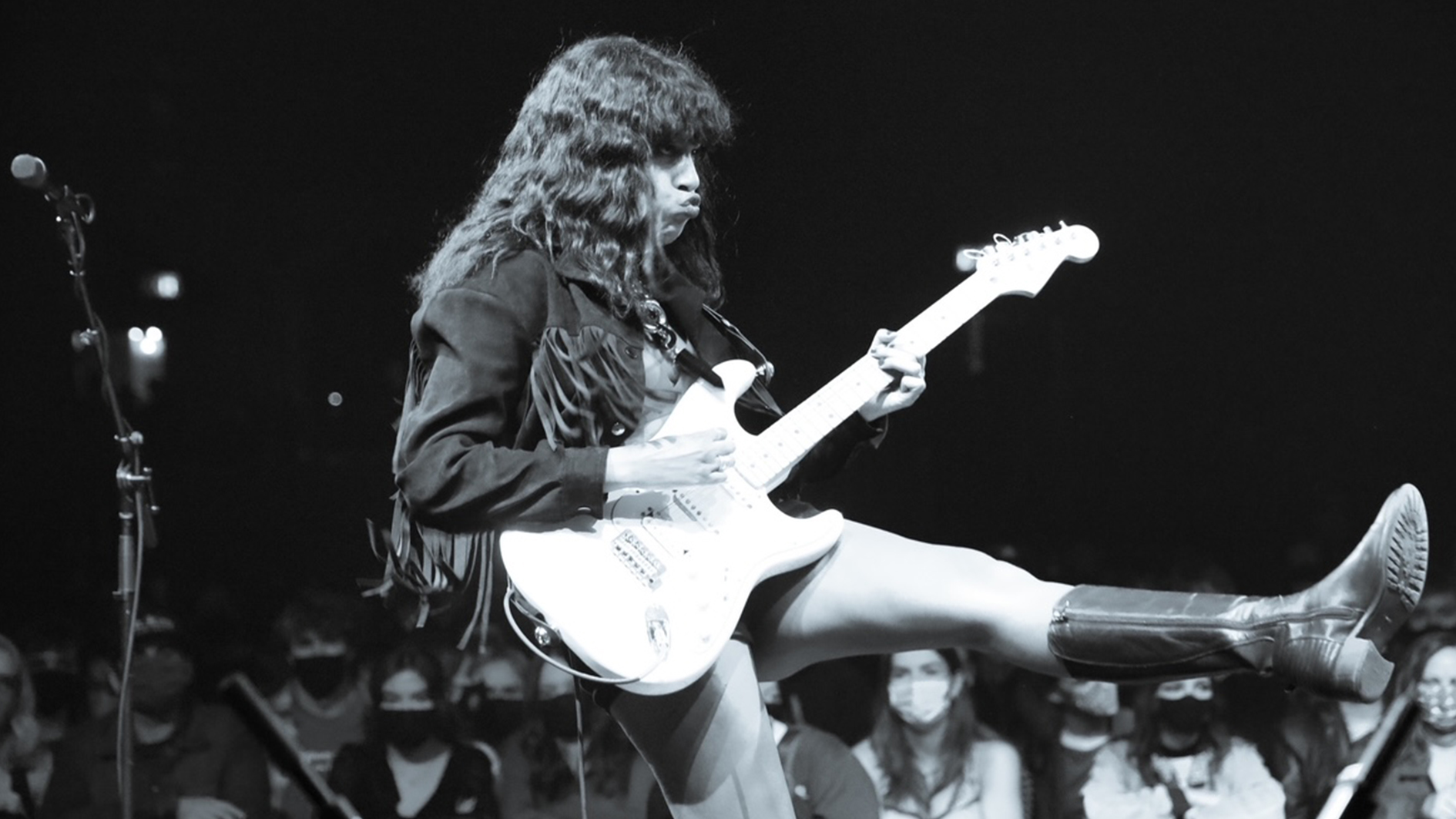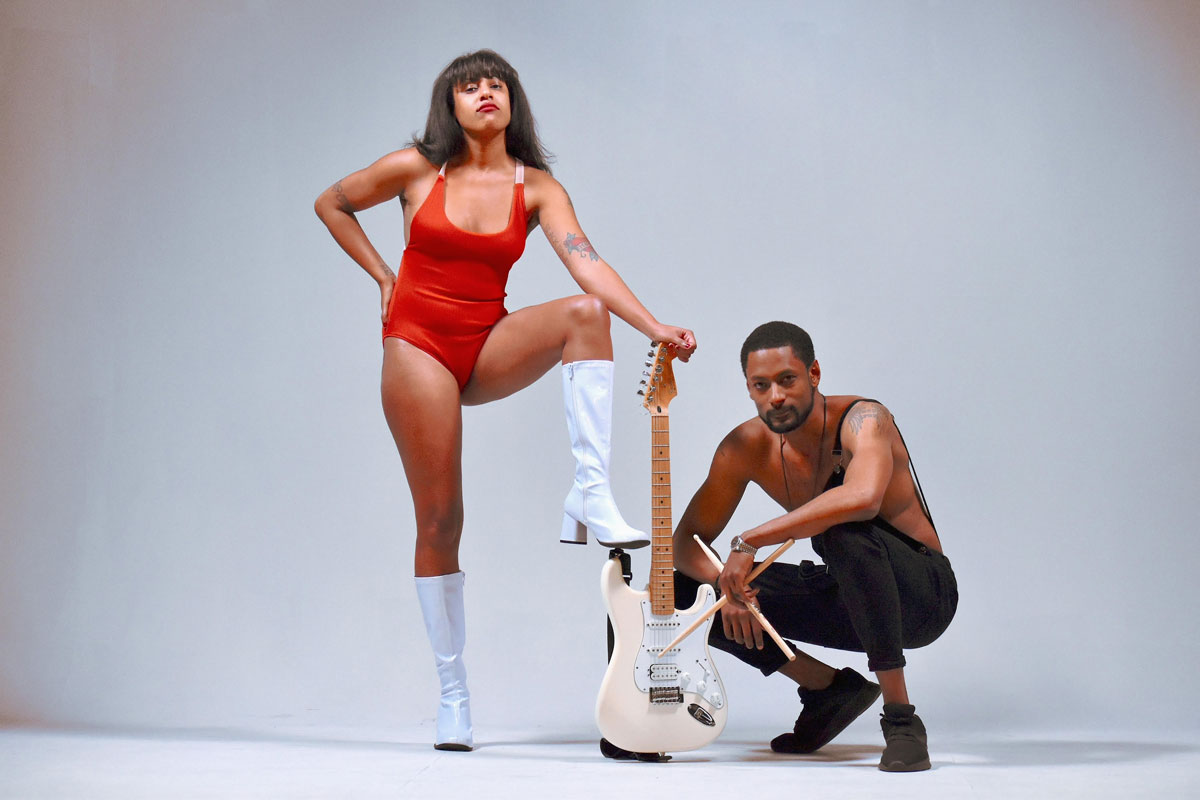The Black Tones' Eva Walker: “We would start our sets with a heavy blues instrumental. It locks people in, like, 'Oh s**t, that Black girl's actually shredding'”
The Strat-toting rocker on the four-note sequence that set her on a quest to conquer the blues and the duo's raucous new Sub Pop single, The End of Everything

Though Mr. Mines is the flipside to Seattle outfit The Black Tones’ new two-song 7-inch for the iconic Sub Pop Singles Cub, the blues-punk instrumental is often the band’s go-to set opener.
As a testament to guitarist Eva Walker’s swampy, wah-crushed expressiveness, it’s a perfect introduction, but the Washington State-based player explains there’s a deeper reason for blasting the intro up front.
“When I was starting with music, any time I went onstage I felt like I had to prove myself to either a white audience or a male audience – or both – so usually [with] the girl on stage with the guitar, they say, ‘Oh, let me guess… you sing,’ without even asking if I play any instrument,” Walker recalls over Zoom.
“The thing with Mr. Mines is we would start every show with it. People probably aren’t going to pay attention immediately, because of what they’re seeing on the stage, so we’ve got to start with this heavy blues instrumental. It always locks people in, like ‘Oh shit, that Black girl’s actually shredding. Holy… what’s the rest of the set going to sound like?’ It’s worked every time.”
The stomped-out swagger found in pieces like Mr. Mines has led to the act opening for anyone from Death Cab for Cutie to Mavis Staples to Weezer. Pearl Jam’s Mike McCready was an early convert, having issued a different 7-inch slab for The Black Tones in 2020 through his HockeyTalkter indie label, while more recently teaming up with the act for a cover of U2’s Pride (In the Name of Love).
Walker has also traded licks onstage with Delvon Lamarr Organ Trio/The True Loves guitarist and longtime friend Jimmy James. A partnership with Pacific Northwest soccer team the Seattle Sounders, meanwhile, found the band bursting through originals and a pair of Jimi Hendrix covers in front of 40,000 sports fans last spring.
It’s fair to say that the Black Tones – whose flexible live line-up is anchored around Walker and her twin brother, Cedric, on drums – have captured people’s attention.
Get The Pick Newsletter
All the latest guitar news, interviews, lessons, reviews, deals and more, direct to your inbox!
While she’s currently a gain-coursing force onstage, Walker admits she was an awkward teen. She gravitated towards a mix of R&B, jazz, rock, and more while growing up in Seattle, but it wasn’t until she saw a clutch of acoustic guitars inside a high school classroom that she contemplated picking up an instrument.
“The first time I went to the arts language teacher’s room, I saw these guitars and was like, ‘Whoa, that’s cool.’ He would actually play in the hallway between classes, and would [also] let students play them,” Walker explains. While fascinated by the acoustics, she had had to quell her nerves before asking if she could give one a try.
“I kept hinting at how I wanted to take a guitar home, like, ‘Hey, these are really cool… I wish I knew how to play!’ Then he was like, ‘Do you want to take one home over Thanksgiving break?’”
Spending time with the instrument over the holidays was a revelation. Before sending her home, the teacher asked her to memorize a sequence – 0-5-3-0 – that she was told to play on the low E. The run of notes put Walker on the musical path she continues to this day with the Black Tones.
I played an open E, then I put my finger on the fifth fret to play the five, went down to the three, and back down to zero, and it was the blues!
“I played an open E, then I put my finger on the fifth fret to play the five, [went] down to the three, and back down to zero, and it was the blues! Duh-duhhhhh-duh-duh. That’s the very first thing I played on guitar: the blues. So, yeah, zero five three zero.
“When I started teaching guitar, that’s the first thing I taught students as well, and they loved it. I told them by playing that you know how to play 5,000 songs – you just don’t realize it yet.”
Over the years, Walker moved on from the high school’s guitar to a First Act acoustic her mom had bought her from Walmart, and eventually onto her longtime favorite, a cream-colored Strat she bought when she was 17.
“It’s the guitar I still use today,” she says of the Fender, which figures big on the Black Tones’ Sub Pop single. “It’s cream white; I got it because I discovered Jimi Hendrix as a teenager and it changed my life. I had to get a guitar just like his.”
Walker keeps a consistent grit throughout the Black Tones catalog, latching onto the high-end bite of the cream Strat’s bridge-set humbucker at all times.
“I keep my settings on that humbucker; I don’t use the other [pickups],” she says. “The tone and volume are all the way up – the same setting I’ve been using for over 15 years. It’s heavy enough for me!”
She currently pushes the gain-heavy sizzle of an Orange Tiny Terror through an unmarked cabinet fit with a ‘70s-era Electro-Voice SRO/12 speaker that she found used.
As a Hendrix devotee, she naturally cranes a Jimi-sig Vox Wah that was gifted to her by a friend, though the pedal has seen better days. “It’s so old I have to use tape to keep the battery in,” she notes. Walker’s chain also includes a tuner and a delay pedal she rarely triggers.
I like being vulnerable when I make music. I do it live because I don’t want anyone to think I’m lying to them. Like, this is me, and this is what I can do
She explains: “I don’t use very many pedals, at all. The thing is, I like being vulnerable when I make music. I do it live because I don’t want anyone to think I’m lying to them. Like, this is me, and this is what I can do. I’m not trying to cover anything up. Not that I’m against people that use a bunch of cool sounds – that’s cool, but I just play rock and roll.”
The Sub Pop single’s other new tune, The End of Everything, is a fittingly lean, yet effective pound of in-the-red chord jangling and garage-rock beats. For the session, Walker additionally colored the tune with a cosmic peal of feedback she coaxed out of a ’72 Marshall JMP. “It started to remind me of pulsars, sounds that have been captured in space,” she says.
Lyrically, it finds Walker personifying herself as Jesus, Buddha, and other religious icons who “came to fuck shit up”. “It’s just a song about the end of the world,” she explains. “It’s not taking a shot at anyone’s religion. It’s just saying I couldn’t care what you believe in, this shit’s going to end and we’re probably making the process faster.”

In the past, Black Tones tracks like The Key of Black (They Want Us Dead) took aim at racism, while The End of Everything manages to be a subversively unifying rally cry, despite its doomsday-looming conceit. In the case of Mr. Mines, though, Walker knows there’s power in stepping away from the mic to let your instrument do the talking.
“I like instrumentals because I don’t always have something to say or sing about. And if you don’t have something to say, then shut the hell up,” she says with a laugh, “but my guitar has something to say in the song, so I’m going to let the guitar take the lead.”
- The Black Tones' new single The End of Everything is out now via Sub Pop.
Gregory Adams is a Vancouver-based arts reporter. From metal legends to emerging pop icons to the best of the basement circuit, he’s interviewed musicians across countless genres for nearly two decades, most recently with Guitar World, Bass Player, Revolver, and more – as well as through his independent newsletter, Gut Feeling. This all still blows his mind. He’s a guitar player, generally bouncing hardcore riffs off his ’52 Tele reissue and a dinged-up SG.
Weezer’s first show was opening for Keanu Reeves’ band Dogstar. Now the John Wick star is set to play a villain in the Buddy Holly hitmakers’ forthcoming mockumentary
“Even the thought that Clapton might have seen a few seconds of my video feels surreal. But I’m truly honored”: Eric Clapton names Japanese neo-soul guitarist as one to watch











